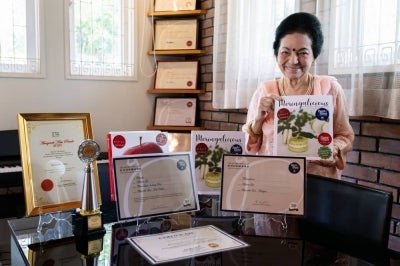Why career breaks aren’t all that bad and what needs to change for mums returning to work
The skills mothers gain during their career breaks—such as time management, crisis handling, negotiation, and emotional intelligence—are invaluable.

Motherhood is a full-time role with no clocking out, but for many women, it also means pressing pause on their careers. Whether it's nurturing their children during the formative years or managing the many demands of family life, countless mothers choose to take a step back from work with the hope of returning when the time feels right.
However, reentering the workforce presents its own set of challenges. From outdated hiring practices to workplaces ill-equipped to support returning mothers, the transition back can be daunting. This is where the real conversation begins: How can we make the return to work smoother for these women?
The Value of Skills Acquired During a Career Break
Talent Corporation Malaysia Berhad (TalentCorp) Chairperson Wong Shu Qi emphasises that the skills mothers gain during their career breaks—such as time management, crisis handling, negotiation, and emotional intelligence—are invaluable. These aren't just "extras." According to Wong, they are critical skills that companies actively seek across all talent levels, from entry-level positions to leadership roles.
"These are not just 'extras,' these are critical skills that companies say they want across all talent levels, from entry-level right up to leadership. If you look at any recent workforce reports, including TalentCorp's Critical Occupations List and Industry-Academia Collaboration studies, soft skills like communication, adaptability, and problem-solving always top the list," she says in an interview with Sinar Daily.
Reforming Hiring Practices to Support Returning Mothers
Women's advocate organisation All Women's Action Society (AWAM) representative Eve Lim echoes a similar sentiment, highlighting the need for reform in hiring policies. These policies should place value on the skills mothers bring to the table and foster an inclusive culture where they feel respected and supported.
According to Lim, several key actions could help support returning mothers. For example, advancing workplace care facilities, like nursing rooms and refrigerators for breast milk, would make a significant difference. Additionally, creating structured "returnship" programs, re-onboarding sessions, and mentorship opportunities can ensure a smoother transition back into the workforce.
Lim also stresses the importance of workplace flexibility, such as offering flexible working hours, remote work options, job-sharing, or part-time roles. TalentCorp's Work-Life Sustainability Programme has shown firsthand how flexible practices help retain talented individuals while boosting overall productivity.
"Through TalentCorp's Work-Life Sustainability Programme, we have seen firsthand how flexible practices help companies retain good people and boost productivity at the same time. We also offer targeted tax incentives under the 2025 Budget for employers who hire women after a career break, with 50 per cent tax deduction on their salaries for up to 12 months through the Career Comeback Programme," says Wong.
Wong further adds that businesses that introduce Flexible Work Arrangements (FWA) benefit from a 50 per cent tax deduction, up to RM500,000, for related costs like training and software. There’s also added support for companies offering paid care leave for employees taking care of children or ill family members.
Policies to Support Returning Mothers
Clear anti-discrimination policies are essential to ensuring that career breaks for caregiving do not penalise mothers in their professional journey. Lim urges companies not to penalize resume gaps and to focus on a candidate’s skills and potential rather than time spent away from the workforce.
"It is important to use performance evaluations based on outcomes, not time spent in the office or online visibility," she says, further emphasising the importance of transparency in pay structures and promotion pathways.
Regular training to combat maternal bias is critical at all levels of leadership, Lim notes. These policies would ensure that a career pause for motherhood is not used as an excuse for slower promotions or biased treatment.
"These policies affirm that a career pause for motherhood is not a valid reason for reduced opportunities, slower promotion, or biased treatment," she says.

Flexibility as a Tool for Sustainable Careers
Both Lim and Wong agree that workplace flexibility is a key element for companies looking to retain talented employees, especially mothers. Flexible work arrangements reduce burnout, improve retention, and boost loyalty. They also create an environment where returnees can come back with renewed clarity, empathy, and motivation.
"These policies should reflect the fact that care work is not the sole responsibility of a mother, but fathers, families, and communities around them," Lim says. Ultimately, she stresses that supporting parents in the workforce is not just an investment in individuals, but in a stronger, more equitable future.
Mothers as Assets in the Workforce
Corporate leader Daneena Rahman also recognises that mothers, especially those returning after a career break, are a valuable untapped resource. She acknowledges that mothers often feel anxious about re-entering the workforce but stresses that employers must provide the understanding and support needed to ease their transition.
"What mothers need from their employers is understanding and support so that they can ease back into their work without difficulty," Daneena says. She suggests companies provide structured return-to-work programs, mentorship, and re-skilling opportunities to help mothers rebuild their confidence and update their technical skills.
Daneena emphasises that mothers bring a unique set of skills—multitasking, prioritisation, crisis management, resilience, nurturing, and emotional intelligence—that should be recognized in recruitment and performance assessments. These life skills can be invaluable to companies looking to cultivate diverse leadership pipelines.
"When employers treat returners as assets, they send a powerful signal that strengthens trust and engagement, and reinforces a sense of belonging and capability, which ultimately results in enhanced business performance," Daneena concludes.
Creating a Culture of Inclusivity
The need for leadership to actively challenge stigma around returning mothers in the workforce cannot be overstated. Daneena suggests that organisations need to reshape their culture to accommodate diverse career paths and celebrate successful returners.
"It is important to set the tone at the top. With more leadership teams openly celebrating diverse career paths, sharing successful returners, and embedding inclusive language in internal and external communications, it helps mothers feel seen and supported in returning to work," Daneena says. Providing role models and peer networks also helps build confidence among returnees.
In conclusion, Daneena stresses that when employers treat returners as assets, they reinforce trust, engagement, and a sense of belonging. This, in turn, leads to stronger business outcomes, proving that supporting mothers in the workforce benefits everyone, not just the individual.
Download Sinar Daily application.Click Here!















